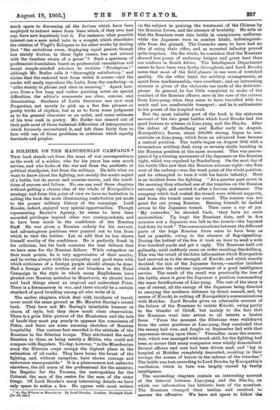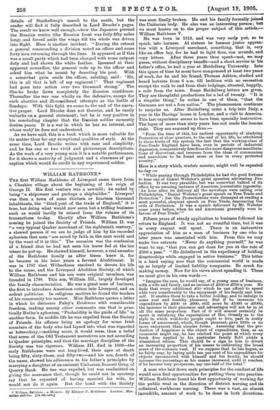A SOLDIER ON THE MANCHURIAN CAMPAIGN.* THIS book stands out
from the mass of war correspondence as the work of a soldier, who for his years has seen much service, and who looks at the war not from the aesthetic or political standpoint, but from the military. He tells what we want to know about the fighting, not merely the scenic aspect of a battle, but its moves and counter-moves, and the condi- tions of success and failure. No one can read these chapters without getting a clearer idea of the whole of Kuropatkin's strategy, and from this point of view we have no hesitation in calling the book the most illuminating contribution yet made to the proper military history of the campaign. Lord Brooke, indeed, enjoyed very special opportunities. Though representing Reuter's Agency, he seems to have been accorded privileges beyond other war correspondents, and to have been much in the confidence of the Russian Staff. He was given a Russian orderly for his servant, and advantageous positions were pointed out to him from which to view the battles. Let us add that he has shown himself worthy of the confidence. He is perfectly frank in his criticism, but his book contains the best defence that we have seen for the Russian failure. While outspoken on their weak points, he is very appreciative of their merits ; and he writes always with the sympathy and good taste with which criticisms of a foreign people should always be done. Had a foreign critic written of our blunders in the Natal Campaign in the style in which many Englishmen have gloated over Russian mistakes in Manchuria, we should have said hard things about an inspired and malevolent Press. There is a freemasonry in war, and there should be a certain standard of good breeding among all who write of it.
The earlier chapters, which deal with incidents of travel, cover much the same ground as Mr. Maurice Baring's recent book. They have not Mr. Baring's inimitable humour or charm of style, but they show much close observation. There is a grim little picture of the Hunhutzes and the tale of heads they must pay yearly to appease the conscience of Pekin, and there are some amusing sketches of Russian hospitality. One curious fact recorded is the attitude of the Russians to the Siberian troops. They attributed the early disasters to them, as being merely a Militia, who could not compare with Regulars. To-day, however, "in the Manchurian army the Siberian corps occupy the highest place in the estimation of all ranks. They have borne the brunt of the fighting, and, without exception, have shown courage and endurance unsurpassable." It is a phenomenon not unknown elsewhere, the old scorn of the professional for the amateur, the Regular for the Yeoman, the metropolitan for the Colonist, the men of the centre for the men of the outer fringe. Of Lord Brooke's many interesting details we have only space to notice a few. He agrees with most writers
• In Eye-Witness in Manchuria. By Lord Brooke. London: Eveleigh Nash. Vs. 6d. net.3
on the subject in praising the treatment of the Chinese by the Russian forces, and the absence of brutality. He tells us that the Russians went into battle in conspicuous uniforms, while the Japanese were in sombre khaki, indistinguish- able from, the ground. The Coasacks seem to have had no idea of using their rifles, and as 'mounted infantry proved quite hopeless. On the whole, he considers that the Russians showed less power of enduring fatigue and great heat than our soldiers in South Africa. The Intelligence Department seems to have been very faulty throughout, and Lord Brooke notes that most of the field-glasses in use were of wretched quality. On the other hand, the artillery arrangements, as apart from marksmanship, were excellent ; and an interesting account is given of the elaborate use made of the field-tele- phone. In general, he has little complaint to make of the conduct of the Russian officers, save in the case of the retreat from Liao-yang, when they seem to have travelled with too much and too comfortable transport ; and he is enthusiastic in his praise of the hospital work.
But the most valuable part of the book is the elaborate account of the two great battles which Lord Brooke had the good fortune to witness at Liao-yang and the Sha-ho. After the defeat of Stackelberg and Keller early in August, Kuropatkin's forces, about 200,000 strong, began to con- centrate on Liao-yang, which from an advanced base became a central position. The battle began on August 30th with a tremendous artillery duel, sixty or seventy shells bursting in the Russian position at the same moment. This was accom- panied by a turning movement of the Japanese on the Russian right, which was repulsed by Stackelberg. On the next day of the battle Oku saw that the Russian extreme right—the flats west of the railway—was the weak point of the whole position, and be attempted to turn it with his heroic infantry. Here is an incident from the fighting. "At a quarter past seven in the morning they attacked one of the trenches on the Russian extreme right, and carried it after a furious resistance. The company which had rushed the trench were without supports, and from the trench came no sound. The tension was too great for one young Russian. Raising himself, he dashed across to the Japanese trench. Then came a cry of joy. 'My comrades,' he shouted back, 'they have no more ammunition.' Up leapt the Russians then, and in five minutes not a Japanese was left in the trench—the bayonet had done its work." The communications between the different parts of the huge Russian force seem to have been as bad as possible, owing to the absence of flag-signalling. During the hottest of the fire it took an hour to send a note four hundred yards and get a reply. The Russians held out gallantly, until suddenly came an order recalling Stackelberg. This was the result of the false information which Kuropatkin had received as to the strength of Kuroki, and which exactly doubled the size of the Japanese forces,—another incident which shows the extreme importance of a good intelligence service. The result of the recall was practically the loss of the battle, since it gave the Japanese a position commanding the inner fortifications of Liao-yang. The rest of the story is one of retreat, all the energy of the Japanese being directed to carrying the southern defences by direct assault, and, by means of Kuroki, to cutting off Kuropatkin's communications with Mukden. Lord Brooke gives an admirable account of the failure of the Russians to isolate Kuroki, owing partly to the blunder of Orloff, but mainly to the fact that the Russians went into action to all intents a beaten force. "From the moment the Siberians were withdrawn from the outer positions at Liao-yang, they concluded that the enemy had won, and fought on September 2nd with that impression strong upon them." Thereafter came the evacua- tion, which was managed with much skill, for the fighting had been so severe that many companies were wholly demoralised. Several officers and men had been driven mad, and "lay in hospital at Mukden completely demented, recalling in their ravings the scenes of horror in the inferno of the trenches." The battle was lost, according to Lord Brooke, by Kuropatkin's vacillation, which in turn was largely caused by faulty intelligence.
The succeeding chapters contain an interesting account of the interval between Liao-yang and the Sha-ho, on which our information has hitherto been of the scantiest. The Russians changed their tactics, and resolved. to assume the offensive. We have not space to follow the
details of Stackelberg's march to the south, but the reader will find it fully described in Lord Brooke's pages. The result we know well enough,—how the Japanese pierced the Russian centre (the Russian front was fully fifty miles long), and forced aside the wings till the whole was driven into flight. Here is another incident. "During the retreat a general commanding a division noted an officer and some forty men returning through the lines. It appeared as if this was a small party which had been charged with some outpost duty and had shown the white feather. Incensed at their apparent cowardice, the general rode up to the officer and asked him what he meant by deserting his post. With a somewhat grim smile the officer, saluting, said : 'Sir, this is all that is left of my regiment !' That regiment had gone into action over two thousand strong." The Sha-ho broke down completely the Russian confidence. Thereafter the war was wholly on the defensive, except for such abortive and ill-cossidered attempts as the battle of Sandepu. With this fight we come to the end of the narra- tive proper. Lord Brooke does not theorise, and he rarely 'embarks on a general statement; but he is very positive in his concluding chapter that the Ressian soldier earnestly desires peace. It is a war in which he has no interest, and whose motif he does not understand.
As we have said, this is a book which is more valuable for its matter than for any exceptional qualities of style. At the same time, Lord Brooke writes with ease and simplicity, and he has one or two vivid and picturesque descriptions. As the work of a very young man it is a notable performance, for it shows a maturity of judgment and a clearness of per- ception which would do credit to any experienced soldier. to-day:—



































 Previous page
Previous page